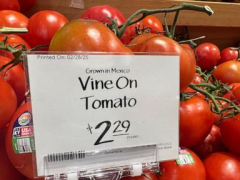Guacamole has been spared from tariffs for now. But salsa may not be so lucky.
While threatened tariffs on Mexican avocados have been put on pause, the U.S. government plans to put a nearly 21% duty on fresh Mexican tomatoes starting July 14. A duty — like a tariff — is a tax on imports, and this one will impact the 4 billion pounds of tomatoes the U.S. imports from Mexico each year.
Proponents say the duty will help rebuild the shrinking U.S. tomato industry and ensure that produce eaten in the U.S. is also grown there. Mexico currently supplies around 70% of U.S. tomato market, up from 30% two decades ago, according to the Florida Tomato Exchange, a trade group.
“Unless we even the playing field in terms of fair pricing, you’re not going to have a domestic industry for fresh tomatoes in the very near future,” said Robert Guenther, the executive vice president of the Florida Tomato Exchange. Florida and California are the top U.S. producers of tomatoes, but most of California’s crop is turned into sauces and other products.
Opponents say the duty will make fresh tomatoes more expensive for U.S. buyers. NatureSweet, a San Antonio-based company that grows tomatoes in Mexico as well as the U.S., said it will be paying millions of dollars each month in duties if the decision isn’t reversed.
“We will look for ways to adapt or streamline our operations, but the truth is, we are always doing that so we run an efficient business already,” said Skip Hulett, NatureSweet’s chief legal officer. “Produce is not a large-margin business. We’re determining what portion of the cost we could absorb, but these added costs will most certainly need to be passed on to the consumer.”
Tim Richards, a professor at the Morrison School of Agribusiness at Arizona State University, expects U.S. retail prices for tomatoes to rise by around 10.5% if the tariffs go through.
Mexico’s government said last month it was convinced it could negotiate over the issue. But if the duty goes into effect, Mexican President Claudia Sheinbaum hinted that Mexico could take similar action against imported chicken and pork legs from the U.S.
The tug-of-war over tomatoes has a long history. In 1996, shortly after the North American Free Trade Agreement went




